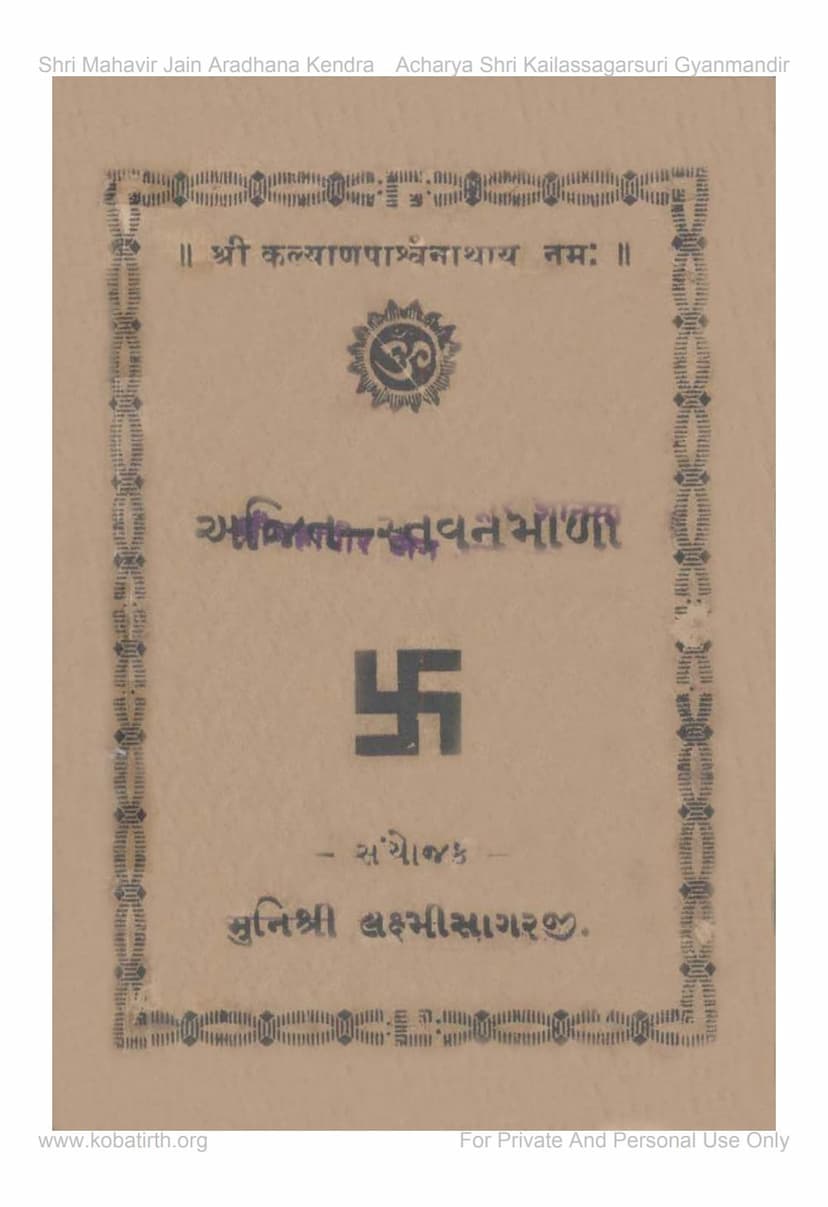Ajit Stavanmala
Added to library: September 1, 2025

Summary
The book "Ajit Stavanmala" (અજિત સ્તવનમાળા) by Muni Lakshmisagarji, published by Shri Buddhisagar Suri Jain Gyanmandir in Vijapur, Gujarat, is a collection of devotional hymns (stanzas or "stavan") dedicated to various Jain Tirthankaras (spiritual conquerors) and revered Jain figures.
Here's a comprehensive summary of its content, based on the provided text:
Core Theme: The central theme of "Ajit Stavanmala" is Jain devotion (Bhakti), expressed through poetic hymns. The stanzas praise the virtues, teachings, and divine qualities of the Tirthankaras, aiming to inspire spiritual contemplation and devotion in the reader. The collection reflects the author's deep reverence for Jain principles and his spiritual guides.
Key Elements and Content:
- Author and Inspiration: The book is authored by Muni Lakshmisagarji. A significant aspect highlighted throughout the text is his deep respect and gratitude towards his spiritual mentor, Acharya Shri Ajitsagar Surishwarji, to whom the book is affectionately dedicated. Muni Hemendrasagarji is also prominently mentioned as a source of inspiration and guidance in the author's literary endeavors.
- Dedication and Acknowledgement: The book is dedicated to Param Pujya Gurudev, Acharya Shri Ajitsagar Surishwarji. Muni Lakshmisagarji expresses his indebtedness for the spiritual guidance and character-building that led him to this path.
- Structure and Content of the Hymns:
- Praise of Tirthankaras: A significant portion of the book consists of stanzas dedicated to various Tirthankaras, including:
- Shri Mahavir: Multiple stanzas focus on Lord Mahavir, highlighting his teachings of ahimsa (non-violence), truth, his renunciation, and his role as a spiritual guide for humanity.
- Shri Adinath (Rishabhdev): Hymns are offered to the first Tirthankara, praising his benevolent nature and the spiritual significance of places associated with him, like Girnar.
- Shri Parshvanath: Several stanzas are dedicated to Lord Parshvanath, celebrating his divine presence, his miracles (like saving the Nagas), and his role as a healer and protector.
- Shri Ajitnath: As indicated by the title, there are likely many hymns dedicated to Lord Ajitnath, whose name means "unconquerable."
- Other Tirthankaras: The collection also includes stanzas for other Tirthankaras like Sambhavnath, Sumatinath, Padmaprabh, Shitalnath, Shantinath, Neminath, Vasupujya, Dharmanath, and Chandraprabh.
- Temple and Pilgrim Site References: Specific Jain pilgrimage sites are mentioned and praised, such as:
- Vimalachal (Siddhachal/Shetrunjay): A significant hymn is dedicated to Vimalachal, highlighting its spiritual allure.
- Ranankpur: The architectural beauty and spiritual significance of Ranankpur are acknowledged.
- Manas (Mahendragiri): A reference to Neminath's association with a sacred mountain.
- Taranga: The holy site of Taranga and Lord Ajitnath's presence there are celebrated.
- Visanagar: The author's place of residence and the locations where these hymns were composed are also mentioned.
- Spiritual Concepts and Values: The stanzas often touch upon core Jain philosophical concepts:
- Ahimsa (Non-violence): The importance of compassion towards all living beings is frequently implied.
- Jnan (Knowledge): The pursuit of divine knowledge and wisdom is a recurring theme.
- Samyak Darshan (Right Faith), Samyak Gyan (Right Knowledge), Samyak Charitra (Right Conduct): These three jewels of Jainism are alluded to as paths to liberation.
- Vairagya (Detachment): The renunciation of worldly pleasures and attachments is praised.
- Devotion (Bhakti): The paramount importance of sincere devotion to the Tirthankaras is evident.
- Karma: The concept of karma and its effects on the soul is implicitly present.
- Moksha (Liberation): The ultimate goal of liberation from the cycle of birth and death is the underlying aspiration.
- Personal Reflections and Gratitude:
- Muni Lakshmisagarji shares his personal journey of spiritual awakening and expresses profound gratitude to his gurus.
- The collection serves as an offering of love and respect to his spiritual lineage.
- Musicality and Poetic Style: The hymns are composed in various traditional Indian poetic meters and ragas (melodies), indicating their suitability for devotional singing and recitation. The language used is Gujarati, rich in devotional sentiment and imagery.
- Purpose of the Book: The book aims to disseminate spiritual devotion, inspire followers, and provide a collection of sacred hymns for personal contemplation and communal worship. It also serves as a testament to the author's literary skills and his dedication to spreading Jain teachings.
- Praise of Tirthankaras: A significant portion of the book consists of stanzas dedicated to various Tirthankaras, including:
Significance and Context:
- Literary Contribution: "Ajit Stavanmala" is presented as a literary work that aims to enrich Jain devotional literature. It showcases the author's ability to blend spiritual depth with artistic expression.
- Spiritual Guidance: The book reflects the strong tradition of Guru-Shishya parampara (teacher-disciple lineage) within Jainism, with Muni Lakshmisagarji paying homage to his spiritual masters.
- Community Support: The publication of the book was supported by various individuals who contributed financially, highlighting the community's appreciation for such spiritual works.
In essence, "Ajit Stavanmala" is a collection of devotional poems that celebrate the eternal glory of the Jain Tirthankaras, offering spiritual solace, inspiration, and a pathway to devotional practice for the Jain community. It is a testament to the author's spiritual journey and his dedication to the Jain faith, guided by his esteemed gurus.